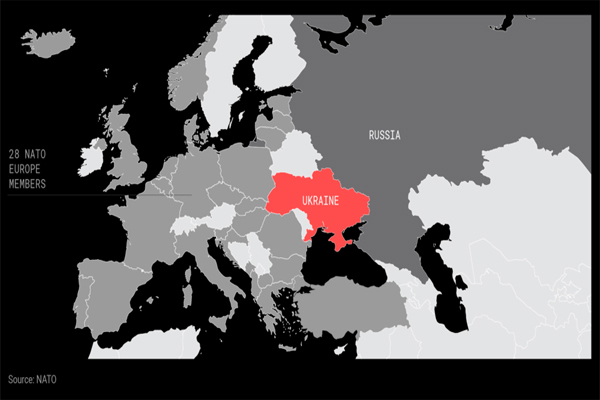
its foreign affairs is largely dictated by the country’s location.
By Clive Crook | Bloomberg
Ukraine wants to join NATO and the European Union. Russian President Vladimir Putin wants to rule it out. NATO and the EU, for their part, neither need nor want Ukraine as a member, at least for the foreseeable future.
All of this suggests, to the naïve observer, a possible way out of the current crisis: All parties can agree that Ukraine will not be joining NATO or the EU anytime soon. Yet the U.S. and its allies are refusing even to discuss the matter. Their posture is irrational and counterproductive — including from Ukraine’s point of view.
NATO’s members know that in the medium term their security interests aren’t served by admitting Ukraine. In the short term, they’re divided over how to push back against Putin, and the U.S. (the nearest thing the alliance has to a leader) is divided against itself. This wobbling partnership isn’t going to fight Russia to defend Ukraine. Granting admission would provoke Russia, make its newest member no more secure, and expose the alliance’s weakness — the worst of all worlds.
Yet last week U.S. Secretary of State Antony Blinken said: “We will uphold the principle of NATO’s open door… I can’t be more clear: NATO’s door is open, remains open, and that is our commitment.”
This is bewildering. NATO is a mutual defense pact, and Ukraine can’t just elect to join. The founding treaty says it would have to be invited by unanimous agreement and contribute to the security of the alliance. In 2008 NATO leaders, without the approval of their legislatures, did say that Ukraine would one day be invited to join — but that promise, even if it were binding, still allows NATO to announce that no invitation will be issued in, say, the next 20 years.
The EU is no more eager than NATO to welcome Ukraine, again despite signals to the contrary. The union is already overstretched, struggling to assimilate Central European partners increasingly at odds with its core purpose of political integration. Ukraine would be its toughest challenge yet.
The EU frequently indulges in this kind of virtue signaling, proposing grand visions without thinking them through. Sometimes it catches itself before it’s too late — despite years of foreplay, for example, Turkey hasn’t joined and isn’t going to. And sometimes the disastrous vision becomes reality — witness the euro. The EU’s blurry message on Ukraine’s someday maybe accession fits the pattern: Entertain the possibility, dream big dreams, and with luck nothing will come of it.
NATO’s and Europe’s flirtations have done Ukraine no favors. They might have led its president, Volodymyr Zelenskiy, to misjudge where its interests lie. Perhaps he thinks Putin is bluffing. Or perhaps he thinks he can seize the moment and get the West to cement a new political and strategic partnership, and sees the risk of war as a price worth paying. All the talk about open doors makes the upside of that gamble look plausible.
In fact, it isn’t. Peace, stability and the opportunity for Ukraine to prosper at arm’s length from Russia on one side and NATO and the EU on the other might be the best achievable outcome.
To be sure, seeming to reward Putin, even with a concession that isn’t really a concession, would be dangerous. He’s a serial menace and would be encouraged to press for more. Any deal on Ukraine that gave him what he wanted on NATO and the EU would need to be broad and include big concessions on his part — starting with guarantees of Ukraine’s territorial integrity, acquiescence to closer EU-Ukraine trade relations, mutual constraints on military deployments, hybrid warfare and more. He’d need to understand that if he rejected such terms and moved against Ukraine, or accepted them and reneged on his pledges, there’d be wounding consequences — including the toughest possible sanctions, crippling economic damage and a hardening of NATO’s defenses.
Could a deal of this sort still be done? It may well be too late. Ukraine would have to agree to it, for one. What Putin wants most and what he’s willing to give up is hard to say: His focus on NATO and Europe might be a feint. Still, refusing even to discuss it is a mistake.
Clive Crook is a Bloomberg Opinion columnist and writes editorials on economics, finance and politics. He was chief Washington commentator for the Financial Times, a correspondent and editor for the Economist and a senior editor at the Atlantic. @clive_crook Energiesnet.com does not necessarily share these views.
Editor’s Note: This article was originally published by Bloomberg Opinion, on February 06, 2022. All comments posted and published on EnergiesNet.com, do not reflect either for or against the opinion expressed in the comment as an endorsement of EnergiesNet.com or Petroleumworld.
Use Notice: This site contains copyrighted material the use of which has not always been specifically authorized by the copyright owner. We are making such material available in our efforts to advance understanding of issues of environmental and humanitarian significance. We believe this constitutes a ‘fair use’ of any such copyrighted material as provided for in section 107 of the US Copyright Law. In accordance with Title 17 U.S.C. Section 107. For more information go to: http://www.law.cornell.edu/uscode/17/107.shtml.
energiesnet.com 02 04 2022











